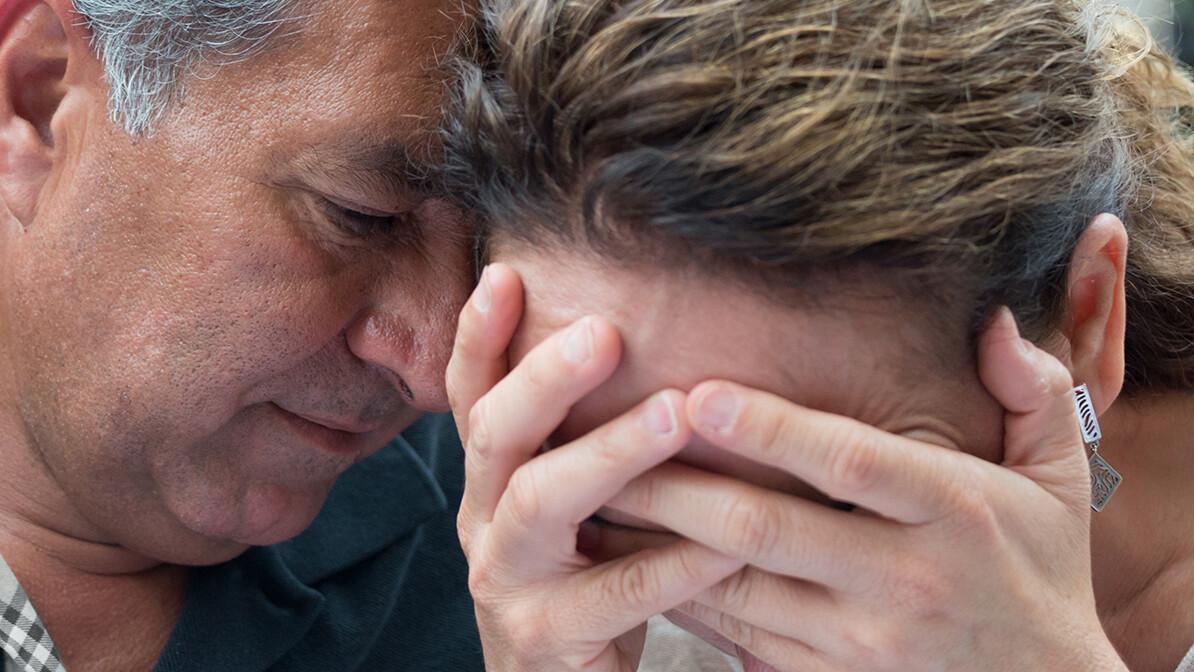
Pregnancy and Infant Loss: Helping Grieving Families Part 1

Sarah Philpott: You know, Rhonda, when I set out to write this book, it was just something that I’ve personally experienced. I had experienced two miscarriages. I knew my mother had a stillbirth before I was born. My mother-in-law had lost a two-year-old child before my husband was even born. Then, a few weeks before our wedding, my sister-in-law passed away in a car accident. She was twenty. So grief had kind of just surrounded our family.
When I started looking for resources for miscarriage, I just couldn’t find exactly what I was looking for at the time. I just started as a lot of us going through grief, journaling and writing, because that was my outlet. I realized as I was doing my search, that possibly the words I was finding from scripture, from grief research, and from other places could help other moms.
That’s who I wrote this book for— moms of loss. You know one in four pregnancies end in miscarriage and unfortunately, one in 160 pregnancies end in stillbirth. So it’s an extremely unfortunate, prevalent death. But at the time of my writing this book, it was something that people didn’t really talk about a whole lot. So I just wanted to write this book for the tribe of women to let them know they’re not alone. Other women are alongside them on this journey and above all, they’re loved by God.
RR: You say that one of the sweetest and most generous things that you can do for a friend going through this loss right now is to send a care package. Which is a wonderful idea considering we can’t just sit with someone who is grieving now. What do you suggest putting in this type of care package?
Sarah Philpott: We definitely are in a society that is encouraged to be a part. So it makes it challenging to show love when we’re not allowed to necessarily congregate at our churches, even small gatherings, or going into the hospital to see a friend who’s hurting.
So I think creating a care package for a friend going through loss is just one of the most beautiful things you can do. And I actually have created a few within the last several months. I really like to include a book, maybe throw in a journal because that really helped me process my grief, but it’s also a place for people to just capture scriptures or write down prayers. I like to put in a pen, a candle, I even sent one out that included some chocolate because I think, you know, when you’re going through any type of grief, you just need that extra love. Some other things you could put are bath gels, bubble bath, a Christmas ornament in remembrance of the mother’s child, or a piece of jewelry. Just really anything that can show tangible love to a family and help a family engage in some self-care and to know that they’re loved.
So those are some things that I would recommend to put in a care package.
RR: What you’re suggesting is to combine mementos tangible things to help attach that memory to remember your child, as well as self-care. And self-care is probably the hardest part when you’re grieving because you’re just trying to keep breathing. Can you talk to us a little bit more about what self-care looks like for women who’s just lost an infant or a pregnancy?
Sarah Philpott: Yes. I think like you just said, it’s hard to even breathe. It’s hard to even take one step forward. It’s hard to even get in a bathtub, some days or take a shower or do all the other caretaking that you need to. So caretaking, I think, is a plan we have to make every day. You know, that can be something as simple as, I’m gonna make sure I take a bubble bath tonight, or I’m going to make sure I get outside and walk in the sunshine today. Just put it down on a list. You know, of course, those are ways you can engage in self-care. But I think also we have to take care of our minds at this point in any type of grief because there’s an internal dialogue that seeks to surround our minds, especially when it’s someone young that you’ve loved.
And that internal dialogue, unfortunately, tries to convince us that we were somehow at fault for our miscarriage or stillbirth or the loss of our infant when that is just absolutely the furthest thing from the truth. So we, as women have to take care of our internal dialogue and we have to hold to the words of God.
You know, I really say that you just choose a scripture. When that internal dialogue starts trying to come in to blame you, you just have to speak that as an untruth and replace that untruth whatever scripture that you want to hold onto it, this moment to just get through those seconds where you start thinking that you’re to blame.
Because unfortunately, research shows self-blame is one of the first things that happens to a woman after facing loss. And it’s untrue, as I’ve said. And I just want to keep saying that it’s untrue self-blame, but that is one of the things that happens after a loss is that internal dialogue comes out.
RR: There’s nothing more painful than grief that is topped by guilt or regret. I think that’s why Satan tries to ice that grief with guilt. How do you combat that? Do you have any advice for a woman who has been dealing with that kind of guilt, and she’s grieving, but feeling that she could have done something a little bit different. Maybe she has other children in the house and really couldn’t slow down the way she wanted to.
Sarah Philpott: Yes. I think you know, holding onto scripture, that was my number one weapon against Satan in that moment. Praying and immediately when that, when that guilt happens, just start praying through it for the Lord to give you eyes to see that you are not at fault. And I think, thirdly, I would also recommend looking at actual medical research and I put some of it in my book Loved Baby, just for the purpose of women to see that in the case of a miscarriage.
For example, it is most often caused by a chromosomal abnormality. It has nothing to do with anything the woman has done. It wasn’t the hot dog you ate. Wasn’t because you forgot to warm up your lunch meat. You know, all those things that we think we’re at fault. Something someone says to them like, “Well, you just ran so much, you’re exercising so much.” But those are not reasons why your baby perished. So I think when we’re armed with scripture when we’re armed with God’s love and prayer, and then we’re also armed with actual research, I think those are the best things we can do to combat those regrets and going back in our minds.
I wish that was a recipe for complete healing, but of course, it’s not. It’s something you realize you just, you just have to fight that battle every single day. And sometimes every single moment of the day.
RR: Before, the interview I shared with you that I had also had two miscarriages one was quite a bit more traumatic than the other. And they were early in my pregnancies, both very early on. And the second one, as I was coming awake from the D&C my doctor was standing beside by bed. I literally woke up crying. I was just sobbing and he looked at me and he said, “You know, it wasn’t actually a baby.” And I said, “It is a loss.” He just kind of stared at me for a moment. Then he said, “That’s right. That’s true. It is.” And that was it. But from his medical standpoint, he looked at my baby as just a blob of cells, it wasn’t viable. For me, I had already loved that baby. The thing about miscarriage, you not only lose that baby in your arms, that’s empty, but you also lose that hope of the future. All the hopes and dreams you had wrapped up in the hope of that baby.
Sarah Philpott: Oh, I think you’re so spot on Rhonda. I mean, I think, you know, all, all mothers of loss, you know, so that exact same way that you just expressed and it’s so devastating when a physician says something to negate what happened or to not recognize that it is a baby that you lost. You know, from the moment I spied my pregnancy test, you know, I had these hopes, these dreams, you know, you could just see your future, what was going to be in three months, you could see there’s going to be a high school graduation.
You do. As a mother, you lose your present identity as a pregnant woman, you lose your future with your baby. And then you also lose out a little bit on your future because of the fear of the unknown is. If you are able to have children again. Or what’s going to happen, and yes, I completely agree with you that it’s so important for us to remember that it is a baby, and that’s why we grieve so deeply.
And the Bible even tells us about how every single life is to be loved and adored. And we have that hope of the future that in heaven we’re going to get to meet again.
…
Order your copy of Loved Baby: 31 Devotions Helping You Grieve and Cherish Your Child After Pregnancy Loss
Trending Now
Sign up today for your Inspiration Today Daily Newsletter
Supercharge your faith and ignite your spirit. Find hope in God’s word. Receive your Inspiration Today newsletter now!
Rhonda Robinson
Rhonda Robinson is a speaker and the author of Freefall: Holding Onto Faith When the Unthinkable Strikes, offering women spiritual wisdom to transform the darkness into a season of profound change and emerge with vision and purpose. Learn more at rhondarobinson.tv
Related Articles
April 18, 2024
Have You Ever Said, ‘God, Please Help Me’?
“Pray. Just pray.” What happens when the words won’t come? How do you begin to pray? Rest assured.…
April 15, 2024
I Want to Live
What does God do with a good ol’ southern boy taken captive by the demon of alcohol? He meets him…
April 8, 2024
Prayers for Healing
An unexpected troublesome medical diagnosis, a strained relationship with family or friend, and…
Next Steps To Strengthen Your Walk
Submit A Prayer Request
We are here for you. Simply click on the button below to reach us by form, email or phone. Together we will lift our hearts and voices with you in prayer.
Partner WIth Us
Sow a seed of faith today! Your generous gift will help us impact others for Christ through our global salvation outreach and other faith based initiatives.
Inspiration TV
Watch Christian content from your favorite pastors, christian movies, TV shows and more.






